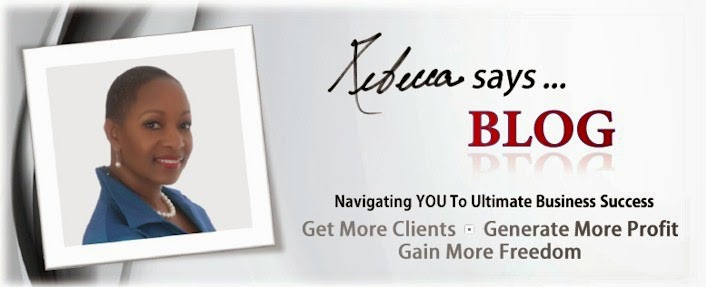As entrepreneurs we're challenged to find ways to attract
new customers and clients, manage our time efficiently, use our funds wisely,
promote our business and plan strategically. Many of us attend conferences,
networking events and training sessions seeking some new and profound
revelation that will catapult our business to the next level. Rather than being
inspired, it's often blah, blah blah...we've heard it all before and we walk
away disappointed that it was just a waste of time. Not because there wasn't
anything of value to take away, but because we graded the experienced based
upon how much of the teaching was more of the same rather than honing in on
that little nugget that could dramatically improve our bottom line.
Suppose you were to take off in a ship at the equator with the intent to sail the globe. Let's say you plot out your route, but without realizing it, you're off by one degree. By the time you return to the same longitude, you would be off course by a thousand miles. This same principle can be applied to your business, but with positive results.
The key to building a long-term, thriving business does not always require a major overhaul, but it could be a matter of making a small shift in the way you're currently doing business. It all depends upon your stage of development. If you're a start-up, it's not uncommon to make a major change in the beginning. But, if you've been in business a while and you're looking to take it the next level, more than likely you may only need to make incremental shifts to position your business for long-term, sustainable growth.
About three years I had a business strategy session with the networking guru, George Fraser. I soaked up every word like a sponge. During the course of the hour, he shared many aspects of business that were not really new--I'd heard them before. I knew, however, that at his level of success, there was something he could impart to me that would be a game changer. Well, he didn't disappoint! In answering my questions, "George, what is the secret to your success?" he advised me to "Build your platform." Someone had suggested that to me two years prior but, at the time, I just didn't take it that seriously. But this time around I had a light bulb moment! Suddenly I realized that this could be the one degree shift I needed to profoundly impact my business for the long-term.
Four little words that can sabotage the success of your business are, "I already knew that." It's not what you know that determines your success, but it's what you DO WITH what you know that makes the difference. If you're hearing more of the same, it could be an indication that you're further along in your development that you realize. Enter every learning opportunity with an open mind. Don't make the mistake of overlooking the obvious in search of the spectacular. The key to unlocking the future of your business may be just one degree away.
Suppose you were to take off in a ship at the equator with the intent to sail the globe. Let's say you plot out your route, but without realizing it, you're off by one degree. By the time you return to the same longitude, you would be off course by a thousand miles. This same principle can be applied to your business, but with positive results.
The key to building a long-term, thriving business does not always require a major overhaul, but it could be a matter of making a small shift in the way you're currently doing business. It all depends upon your stage of development. If you're a start-up, it's not uncommon to make a major change in the beginning. But, if you've been in business a while and you're looking to take it the next level, more than likely you may only need to make incremental shifts to position your business for long-term, sustainable growth.
About three years I had a business strategy session with the networking guru, George Fraser. I soaked up every word like a sponge. During the course of the hour, he shared many aspects of business that were not really new--I'd heard them before. I knew, however, that at his level of success, there was something he could impart to me that would be a game changer. Well, he didn't disappoint! In answering my questions, "George, what is the secret to your success?" he advised me to "Build your platform." Someone had suggested that to me two years prior but, at the time, I just didn't take it that seriously. But this time around I had a light bulb moment! Suddenly I realized that this could be the one degree shift I needed to profoundly impact my business for the long-term.
Four little words that can sabotage the success of your business are, "I already knew that." It's not what you know that determines your success, but it's what you DO WITH what you know that makes the difference. If you're hearing more of the same, it could be an indication that you're further along in your development that you realize. Enter every learning opportunity with an open mind. Don't make the mistake of overlooking the obvious in search of the spectacular. The key to unlocking the future of your business may be just one degree away.
At
211 degrees, water is hot; at 212 degrees, it boils. With boiling water comes
steam; and steam can power a locomotive. One extra degree makes all the
difference
--Mac Anderson, Simple Truths


